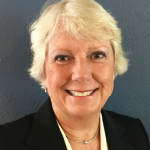A: The Internet was very important to advance our research forward and reach a nationwide audience. Back before Facebook went mainstream, the Internet allowed us to transform our stress-management intervention from a clinic-based, computer-assisted delivery method to an online approach that simulated dialogue with a counselor similar to a face-to-face program. And the technology [helped] disseminate our research to a broad, community-based audience.
ARHP Addie Thomas Service Award
 Kim Kimpton, PT
Kim Kimpton, PT
Physical Therapist, Centennial, Colo.; member of the ACR Committee of Government Affairs
Background: When you’re a past ARHP president, a veteran of rheumatology advocacy and involved in the organization for some 33 years, it’s no surprise when you’re honored for service to your field.
“The passion I have for rheumatology goes beyond the workplace,” Ms. Kimpton says. “I want to make access to care easier [and more] available for the patients I serve. It’s putting in your personal time and your personal space. And that only comes with a passion for patients and a passion for the profession.”
Ms. Kimpton graduated from the University of Vermont with a bachelor of science in physical therapy in 1980. She’s since held staff positions at Rose Medical Center and HealthMark, both in Denver. She has served as a consultant and speaker at both regional and international medical events, and was president of the ARHP in 2007.
Q: How important is passion when dealing with patients who have chronic conditions, as most rheumatologists do?
A: You build relationships with these people because you’re likely to see them over and over again. There is, I think, a higher commitment, because if you don’t do a good job, it’s going to come back. And you can’t just pass it off. These people are living with this disease day to day, month to month, year to year. You’re their person, and they look to you to better their lives.
Q: Why do you encourage others to become involved in service?
A: It reinforces your commitment. People always say, ‘You get back more than you give.’ And that’s always true. If you choose an area of volunteering that’s your passion, you always get back more than you give. And that will keep people volunteering and becoming more involved. The greatest challenge is getting them to take that first step of volunteering on any level with the association.
Q: What’s the future of rheumatology?
A: The greatest challenge is attracting new professionals to the field. Rheumatology requires more education, and the patients are more complex. Even in a physical therapy situation, it’s very, very difficult to treat someone with chronic disease in timeframes that make your care profitable.



